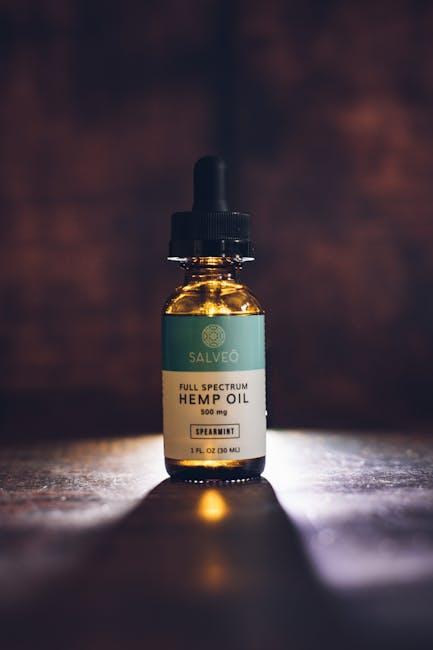In a world awash with vitamins, minerals, and herbal extracts, selecting the right supplement can feel like navigating a labyrinth without a map. The promise of better health and vitality often comes packaged in bottles with bright labels and alluring claims, but beneath the surface lies a crucial question: How do you distinguish truly high-quality supplements from the rest? This journey requires more than just a quick glance at the price tag or ingredients list. It calls for a thoughtful approach—examining sourcing, manufacturing practices, and scientific backing—to ensure each capsule you put into your body is a step towards genuine well-being. Join us as we unravel the essentials of choosing high-quality supplements, empowering you to make informed decisions in pursuit of your health goals.
Table of Contents
- Understanding Supplement Labels for Informed Choices
- Identifying Trusted Brands and Certifications
- Evaluating Ingredient Transparency and Dosage Accuracy
- Balancing Quality with Cost Effectiveness
- Consulting Healthcare Professionals for Personalized Guidance
- Q&A
- To Conclude

Understanding Supplement Labels for Informed Choices
When navigating the world of dietary supplements, the label serves as your most reliable guide. It’s essential to scrutinize the information presented to ensure you’re making choices aligned with your health goals. Look beyond the branding and marketing buzzwords, focusing on the Supplement Facts panel. This section reveals the amount of each active ingredient per serving and its % Daily Value (%DV), helping you gauge if the supplement fits your nutritional requirements. Pay attention to ingredient names—opting for supplements with recognizable, scientifically backed components rather than proprietary blends, which often mask ingredient quantities.
Additionally, be mindful of the label’s list of inactive ingredients and potential allergens. Fillers, binders, and artificial additives may affect absorption or cause sensitivities. Here’s a quick checklist to assess labels effectively:
- Serving size & dosage: Ensure they align with your needs and doctor’s advice.
- Expiration date: Confirm freshness for safety and potency.
- Certification seals: Look for third-party testing badges (e.g., USP, NSF) indicating quality assurance.
- Manufacturer info: Transparency about origin often correlates with trustworthiness.
| Label Element | Why It Matters | Tips |
|---|---|---|
| Supplement Facts | Shows ingredient amounts & potency | Check %DV and ingredient clarity |
| Inactive Ingredients | Indicates fillers or allergens | Avoid unnecessary or harmful additives |
| Expiration Date | Ensures product efficacy | Prefer fresh products |
| Certifications | Confirms third-party testing | Look for USP, NSF, or GMP seals |

Identifying Trusted Brands and Certifications
When it comes to selecting supplements, trust is crucial, and it often starts with the brand. Look for companies with a transparent track record and a proven commitment to quality. Established brands tend to invest more in rigorous testing, sourcing premium ingredients, and adhering to manufacturing standards, ensuring you get what’s on the label. Additionally, customer reviews and third-party lab results can offer valuable insights into consistency and product efficacy.
Certifications play a pivotal role in validating supplement quality. To help navigate the market, here are some key badges to watch for:
- NSF International: Confirms products meet strict standards for safety and label accuracy.
- USP Verified: Ensures that supplements contain the ingredients listed, in the declared potency and amounts.
- GMP Certified: Indicates compliance with Good Manufacturing Practices, emphasizing quality control.
- Non-GMO Project: Verifies ingredients are free from genetically modified organisms.
| Certification | What It Ensures |
|---|---|
| NSF | Product safety & label accuracy |
| USP | Ingredient potency & quality |
| GMP | Manufacturing best practices |
| Non-GMO | Free from GM ingredients |

Evaluating Ingredient Transparency and Dosage Accuracy
When selecting supplements, it’s essential to prioritize brands that offer full transparency regarding their ingredients. Look for labels that clearly list every component, including active and inactive ingredients, along with their respective amounts. This openness allows you to verify that nothing harmful or unnecessary has been included, ensuring your safety and optimal health benefits. Transparency also reflects the manufacturer’s confidence in their product’s quality and efficacy.
Equally important is the accuracy of the dosages provided. Dosage amounts should align with scientifically-backed recommendations and be precisely measured to guarantee effectiveness. Beware of vague terms like “proprietary blend” without clear quantities—these can mask insufficient dosages of key nutrients. For a quick comparison, here’s a simple guide to typical dosages for common supplement ingredients:
| Ingredient | Recommended Dosage | Common Issues |
|---|---|---|
| Vitamin D3 | 1000-2000 IU/day | Under-dosed in many products |
| Omega-3 Fish Oil | 500-1000 mg EPA/DHA | Mislabeling EPA/DHA amounts |
| Magnesium | 200-400 mg/day | Low bioavailability forms |
By insisting on clear ingredient disclosures and trustworthy dosage labeling, you empower yourself to select supplements that truly deliver on their promises without hidden surprises.

Balancing Quality with Cost Effectiveness
Investing in supplements is not just about finding the cheapest option but about ensuring you get the most value for your money. When selecting supplements, consider brands that prioritize transparency, ingredient quality, and third-party testing. These aspects serve as a guarantee that what you’re putting into your body is both safe and effective. Sometimes, a slightly higher price tag reflects a commitment to sourcing premium raw materials and maintaining rigorous quality control processes, which can minimize risks and maximize benefits.
To strike the perfect balance, focus on these key factors:
- Ingredient Purity – Avoid fillers and artificial additives that offer little benefit.
- Certification and Testing – Look for certifications like GMP or NSF that ensure quality standards.
- Serving Sizes – Compare the potency per serving rather than just price per bottle.
- Customer Reviews – Real user experiences can reveal if a product is worth its cost.
| Factor | Low Cost | High Quality |
|---|---|---|
| Purity | May include fillers | Minimal additives |
| Testing | Limited or none | Third-party verified |
| Potency | Variable dosing | Consistent, effective dose |
| Customer Feedback | Mixed experiences | Generally positive |
Ultimately, balancing cost with quality requires thoughtful evaluation. Choosing the right supplements is a strategic decision that prioritizes your health and well-being over short-term savings.

Consulting Healthcare Professionals for Personalized Guidance
Every individual’s health needs are unique, making personalized advice from healthcare professionals invaluable when selecting supplements. Experts such as dietitians, nutritionists, and physicians can assess your dietary habits, health history, and existing conditions to recommend formulations that truly complement your lifestyle. Rather than relying solely on marketing claims, these specialists consider factors like absorption rates, potential interactions with medications, and appropriate dosages tailored specifically to your body’s requirements.
When consulting with a healthcare professional, come prepared to discuss:
- Current medications and supplements you are taking to avoid adverse interactions.
- Specific health concerns or goals such as immune support, bone health, or energy levels.
- Dietary preferences and restrictions which can influence the choice of supplement forms and ingredients.
- Any known allergies to ingredients commonly found in supplements.
| Professional | Focus Area | Benefit |
|---|---|---|
| Nutritionist | Diet and nutrient balance | Customized supplement plans aligned with diet |
| Pharmacist | Medication-supplement interactions | Safety and awareness of possible contraindications |
| Primary Care Doctor | Overall health assessment | Holistic recommendations incorporating medical history |
Q&A
Q: Why is choosing high-quality supplements important?
A: High-quality supplements ensure you’re getting the intended nutrients without harmful additives or contaminants. They also tend to have better absorption, meaning your body actually benefits from what you take.
Q: How can I identify a high-quality supplement?
A: Look for third-party testing seals, clear ingredient lists, and transparent labeling. Reputable brands often provide certifications like NSF, USP, or ConsumerLab approval, confirming purity and potency.
Q: Are expensive supplements always better?
A: Not necessarily. Price can reflect quality, but it’s not a guarantee. Some mid-range supplements offer excellent value, while some pricey ones may contain filler ingredients or unnecessary additives.
Q: What role does the form of the supplement (pill, powder, liquid) play?
A: The form can affect absorption and convenience. For example, liquid forms may absorb faster, but pills are easier to store and dose. Choose the form that fits your lifestyle and preferences without compromising quality.
Q: How important is the source of the ingredients?
A: Very important. Ingredients sourced from reputable suppliers with sustainable and clean production methods tend to be purer and safer, free from contaminants like heavy metals or pesticides.
Q: Should I consult a healthcare professional before starting supplements?
A: Yes. A healthcare provider can help determine if you need supplements, assess potential interactions with medications, and recommend appropriate dosages tailored to your health.
Q: Can “natural” or “organic” labels guarantee supplement quality?
A: These labels indicate certain farming or ingredient standards but don’t automatically ensure a supplement is high-quality. It’s essential to consider testing, brand reputation, and ingredient transparency as well.
Q: What are some red flags to watch out for?
A: Vague ingredient lists, exaggerated health claims, lack of dosing information, or absence of third-party testing can be warning signs. Also, avoid supplements that promise quick fixes or miracle results.
Q: How can storage affect supplement quality?
A: Improper storage can degrade potency. Keep supplements in a cool, dry place away from sunlight and moisture, and always check expiration dates.
Q: What’s the best approach to integrating supplements into a healthy lifestyle?
A: Use supplements to complement—not replace—a balanced diet and regular exercise. Focus on quality, awareness, and consistency to truly support your wellness journey.
To Conclude
In the vast landscape of health and wellness, choosing high-quality supplements is more than just a purchase—it’s a commitment to your well-being. By staying informed, prioritizing transparency, and listening to your body, you can navigate the aisle with confidence and clarity. Remember, the best supplement is one that supports your unique journey, fueling not just your body, but your peace of mind. Here’s to making choices that truly enhance your health, one thoughtful decision at a time.














Leave feedback about this